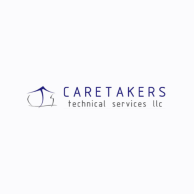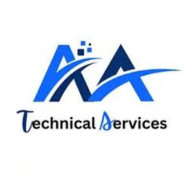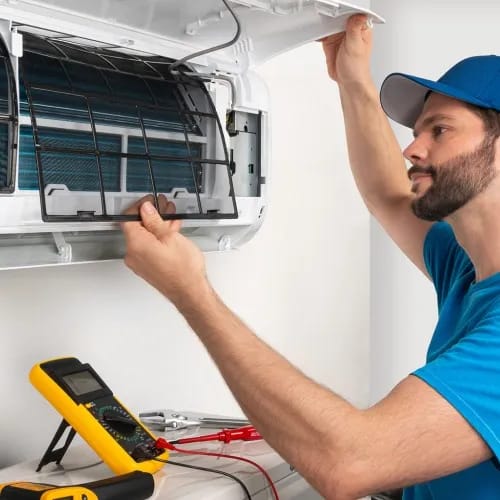Mujahid Ali Ghulam Technical Services
Jumeirah Village - Dubai
Products & Services:
AC services (repair, split & central AC installation, maintenance), home appliance installation (fri More..
Since : 1996
Binafix Technical Services LLC
Hor Al Anz - Dubai
Products & Services:
AC Installation And Maintenance, Plumbing Works, Electrical Work, Masonry, Carpentry Works, Painting More..
Since : 2024
Ryan Technical Services
Al Quoz4 - Dubai
Products & Services:
AC Repair Services, AC Cleaning and Maintenance, AC Installation and Dismantling, Plumbing Services, More..
Since : 2021
Technical Repairing Services
International City - Dubai
Products & Services:
Technical repairing services, AC maintenance, electrical maintenance, appliance repair, plumbing ser More..
Since : 2020
Town House Building Materials Trading LLC
Jumeirah Village Triangle - Dubai
Products & Services:
House Maintenance, Plumbing Works, Electrical Works, Carpentry Works, Painting Works, Flooring Works More..
Since : 2020
Ramz Al Wafa Technical Services
Al Bada, Satwa - Dubai
Products & Services:
AC installation & repair, Deep AC cleaning, AC maintenance, Electrical installations & repairs, Indo More..
Since : 2015
Dream Zone Services
Al Karama - Dubai
Products & Services:
HVAC duct cleaning, AC installation, AC maintenance services, Deep cleaning services, Residential & More..
Since : 2015
KVC TECHNICAL SERVICES CO LLC
Al Karama - Dubai
Products & Services:
AC Duct Cleaning, AC Coil Cleaning, AC Leakage Repairing, AC Drain Flushing, General AC Services & R More..
Since : 2021
Ulti Trend Technologies
Business Bay - Dubai
Products & Services:
Home Automation, Sound System, CCTV & Intercom, Home Cinema, Smart Locks, Intrusion Alarm, Anti-thef More..
Since : 2021
Fast and Memorable Technical Services
Jumeriah Circle - Dubai
Products & Services:
Fitout Work, Carpentry and Joinery Services, Electrical Work, Painting Work, Garden Maintenance Serv More..
Since : 2022
Mainstream Technical Services LLC
Dubai Investment Park 2 - Dubai
Products & Services:
Joinery Services, Metal Decor, Glass Works, Interior Fit-Out Services in Dubai. More..
Since : 2023
Jashim Anjom Technical Services
Al Qusais - Dubai
Products & Services:
Gypsum Ceiling, Electrical Works, Painting Works, Wall Partition, Wall and Floor Tiles, Renovation F More..
Since : 2022
Bait Al Warsan Technical Services LLC
Al Barsha - Dubai
Products & Services:
Technical services, AC maintenance, Electrical services, Ceiling installation, Home maintenance serv More..
Since : 2025
Mohsin Hassan Technical Services Co
The Centro - Dubai
Products & Services:
Maintenance services, villa renovation, home improvement, AC maintenance, AC repair and installation More..
Since : 2020
RCB BUILDING MATERIALS TRADING LLC
Deira - Dubai
Products & Services:
Supplier of RCB Hardware, BOSCH Power Tools, DEWALT Power Tools, MAKITA Power Tools, NATIONAL PAINTS More..
Since : 2004
Soft Fitting Pipes & Fittings Trading Co LLC
Al Quoz - Dubai
Products & Services:
Supplier of ARISTON Water Heaters, ARISTON Solar Water Heaters, ATLANTIC Water Heaters, MILANO Water More..
Since : 2022
Caretakers Technical Services
Painting & Finishing - Dubai
Products & Services:
Air Conditioning Services, Plumbing Services, Electrical Work, Painting & Finishing, Tiling & Floori More..
Since : 2000
Btu Electromechanical Works LLC
Business Village - Dubai
Products & Services:
MEP Contracting, HVAC Contracting, Electrical Contracting, Chilled Water Pipe Contracting, Chilled W More..
Since : 2000
FSTC Technical Services LLC
Al Quoz - Dubai
Products & Services:
technical services, HVAC maintenance, duct cleaning, MEP contracting, mechanical services, electrica More..
Since : 2025
Dream Cool Air Conditioning System LLC
France Cluster - Dubai
Products & Services:
Air Conditioning Installation, AC Maintenance, AC Repair, HVAC Services, Split AC Installation, Duct More..
Since : 2010
KS AC Repair
Jumeriah Golf Estates - Dubai
Products & Services:
AC repair services, AC installation services, AC maintenance services, split AC servicing, central A More..
Since : 2015
We Fix Forever Technical Services
Al Qusais 2 - Dubai
Products & Services:
AC Maintenance Service, Electrical Maintenance, Plumbing Repairs, Home Painting Service, Handyman Re More..
Since : 2018
Al Jumhoor Building Maintenance
Al Quoz - Dubai
Products & Services:
Building maintenance, electrical, plumbing, air conditioning, painting, civil maintenance works, han More..
Since : 2023
Al Samraa - Maintenance Company
Al Karama - Dubai
Products & Services:
Electrical, Plumbing, Carpentry, Painting, Locksmith and Electronics repair services in Dubai More..
Since : 2015
M W J T Alnar Technical Services L.L.C
Business Bay - Dubai
Products & Services:
Electrician Service, 3-Phase Electrician Service, Plumbing, Painting, Carpentry, HVAC Solutions, Kit More..
Since : 2020
PPTS Electrical & Mechanical Engineering LLC
Deira - Dubai
Products & Services:
HVAC services, electrical services, plumbing services, automation systems, fire safety systems, MEP More..
Since : 2009
Workman Technical Services
Al Khabaisi - Dubai
Products & Services:
Air Conditioner Installation, Air Conditioner Maintenance, GI Ducting Fabrication and Installation, More..
Since : 2010
Atlantic World Technical Services Co L L C
Port Saeed - Dubai
Products & Services:
Building Construction, Villa Projects, Apartment Renovations, Repair and Maintenance, Electrical Ser More..
Since : 2022
ALAIS General Trading LLC
Deira - Dubai
Products & Services:
Supplier of ABB Electrical Switchgear, GAVE Electrical Switchgear and HIMEL Electrical Switchgear in More..
Since : 2011
Ahmed Amin Technical Services
Deira - Dubai
Products & Services:
Custom Furniture, Shelving Units, Cabinets, Wooden Structures, Gypsum Partitions, Interior Design So More..
Since : 2016
Lennora Trading LLC
Al Qusais - Dubai
Products & Services:
Floor Type Cable Trunking, Armoured Cables, AC Grills, Split AC Dealers, Commercial Refrigeration Pa More..
Since : 2024







































